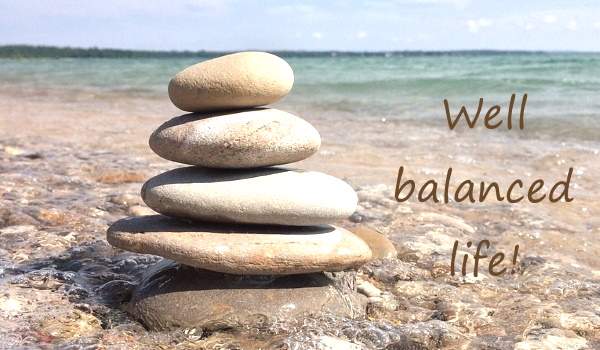5 Tips for Living a Balanced Life
A balanced life is essential for personal effectiveness, peace of mind, and living well. The challenge is to balance what we must do with what we enjoy and choose to do. Physical and emotional health consequences can occur if we cannot reduce stress and manage a balanced life.
Z. Hereford


A balanced life is essential for personal effectiveness, peace of mind, and generally living well.
Whether we work, attend school, or are retired, we all have responsibilities. There is always someone, or something, to answer to. There are things we want to do and things we must do.
The challenge is to balance what we must do with what we enjoy and choose to do. If we cannot reduce stress and manage a balanced life, physical and emotional health consequences can occur.
5 Tips for living a balanced life:
1. Take care of and nurture yourself. You cannot accomplish anything if you're unhealthy. Get plenty of rest, exercise, and eat properly.
Many think we can burn the candle at both ends, eat junk food, get little exercise, and still function adequately.
While we may be able to get away with this for a while when we're young, at some point, this lifestyle catches up with the best of us. Burnout is a real possibility.
Set aside time each day for an activity you enjoy, such as walking, working out, or listening to music. You can also unwind by reading, meditating, or taking a hot bath after a hectic day.
2. Know your priorities. Balance does not entail cramming in every activity possible. Examine your values and decide what's important to you, then set your boundaries. You may be building a career, starting a family, or attending school. Your focus and energies will be different depending on your stage in life.
Avoid becoming overwhelmed by juggling too many big projects at once. For example, planning a wedding is not a good idea when you're studying for the bar exam. Nor is the notion of starting a family when unsure about your career direction or relationship status.
Not knowing what you want and trying to do everything at once can be a recipe for disaster instead of the road to leading a balanced life. As the saying goes, "Do not bite off more than you can chew."
3. Create an efficient mindset. Be organized and plan. Take time at the beginning of each week to assess what needs to be done. Make a to-do list in a planner or calendar for upcoming appointments, impending exams, or meetings to attend.
Be sure also to allow for recreation and quality time for yourself and your family. Connecting with family and friends will recharge your batteries and make you more efficient in the long run.
4. Expect the unexpected. Rather than get stressed and upset, learn to roll with the punches when something over which you have no control happens. You could get stuck in traffic, your computer could crash, or your child could get sick with chickenpox. Stuff happens.
We've all experienced the unexpected. If you accept that anything can happen at any time, it's less likely it throw you off your stride when it does. Be able to adjust your game plan.
Note also that there are times when achieving balance may not be possible. For instance, you may have a family or career crisis that needs your immediate and undivided attention. It may require an exceptional amount of your time and resources. When that happens, do whatever it takes, and when things go back to normal, take time to refresh and rejuvenate yourself.
5. Maintain a positive mental attitude. Begin each day intending to make the best and most of it. It may not always go as planned, but it can go more smoothly if you put it in perspective.
Part of living a balanced life is learning to deal with adversity, unforeseen events, and uncertainty. If you practice not letting things get to you, you will learn to live a well-balanced and less stressful life and to live in and savor the moment.
Let your life unfold once you've done everything you can within your control. Be prepared for the future, but don't worry about it.
While we can't anticipate and plan for everything in our lives, we can decide how, where, and when to concentrate our energies.
While doing so may require some critical thinking and problem-solving, it will ultimately lead to much less stress and a balanced life.
